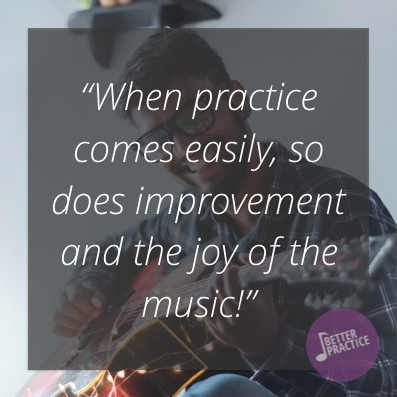Parents, this one’s for you! One of the biggest struggles as music teachers is getting students to practice at home. We can really only help them when we meet for lessons (unless you have Better Practice). Luckily, there are a few easy ways you (the parent) can help! Support at home and the right practice environment can make all the difference. And when practice comes easily, so does improvement and the joy of the music! Here are some easy home practice tips that you can help your child with:

1. Walk your child to the instrument
As many piano teachers say, the hardest part of practice is simply getting to the bench (meaning the piano bench, but this is true for students learning all instruments!). Lucky for us, this issue has an easy fix: just walk your child to the instrument and sit him down when it’s time for practice! Children are used to being physically brought to their activities (most kids are dropped off to lessons, sports practice, school, etc.). And once they’re there, they have adults guiding them on their activities through the course of the day/session. At home however, it’s easy as a parent to simply say, “Go practice” – but it’s much easier said than done. It can be daunting for a student to go into a task alone, especially when most activities are guided.
You, the parents, can help in a big way with a small action: helping them start. Once they get going, momentum – especially when using an app like Better Practice – will push them through. So, walk them to the instrument, help them get all of their practice materials in order, come up with a practice plan and goals for the day, then get them going. Sometimes that’s all they need!
2. Isolate the practice area
Kids are usually very focused on the present and their current environment. It makes them much more observant beings than us adults, but sometimes it backfires. For example: when it comes time to practice and… the practice space is in the toy room. As adults, we can look at the big picture and shift our focus to our long-term goals of improvement and ignore the toys directly at our feet. As kids, that’s not so easy. They see toys, they think about toys. It doesn’t even matter if the toys are actually out. When teaching in students’ home, I’ve had trouble keeping the attention of students who just couldn’t stop eyeing their toy chest in the room – and it was closed! Just being in the same space they usually play in puts their minds into “play” mode. They couldn’t wait for lessons to be over to play with the toys they knew were in that chest. And that was in lessons. Imagine if they were sent to the toy room to practice on their own.
I stress the importance of having a designated practice space free of distractions because productive practice takes focus! You can’t mindlessly repeat and noodle on sections while you’re staring at a TV on nearby. Trust me – 10 minutes of intense, focused practice is way more productive than 30 minutes of half-focused noodling (that might even be totally unproductive or counterproductive). If your child is getting distracted by toys in the room, it’ll take twice the amount of time it would take in a focused space – which ultimately means slow progress, boredom and/or frustration.
3. Practice in the morning
The afternoon is filled with activities that compete for your child’s time. Do they need to finish homework? Go to dance class? Go to an after-school tutoring program? Do they have playdates? Family time? Not to mention afternoons are usually when they come home exhausted from everything else and sometimes knock out for a nap. If you really want to commit to at least a little bit of practice (10-15min!) a day, the morning is probably the best time for it. Set a routine and help your child get that focused practice in while their mind is fresh. But – if your child is not a morning person and this would make for a very reluctant, grumpy practice, don’t do it. It only works if the extra few minutes in the morning wouldn’t be a big deal and would help get practice out of the way for the day.
What if you’re a busy parent who isn’t always at home during your child’s practice hours? Better Practice has you covered: you can opt to get daily practice summaries emailed to you or even get notified when your child begins practice!